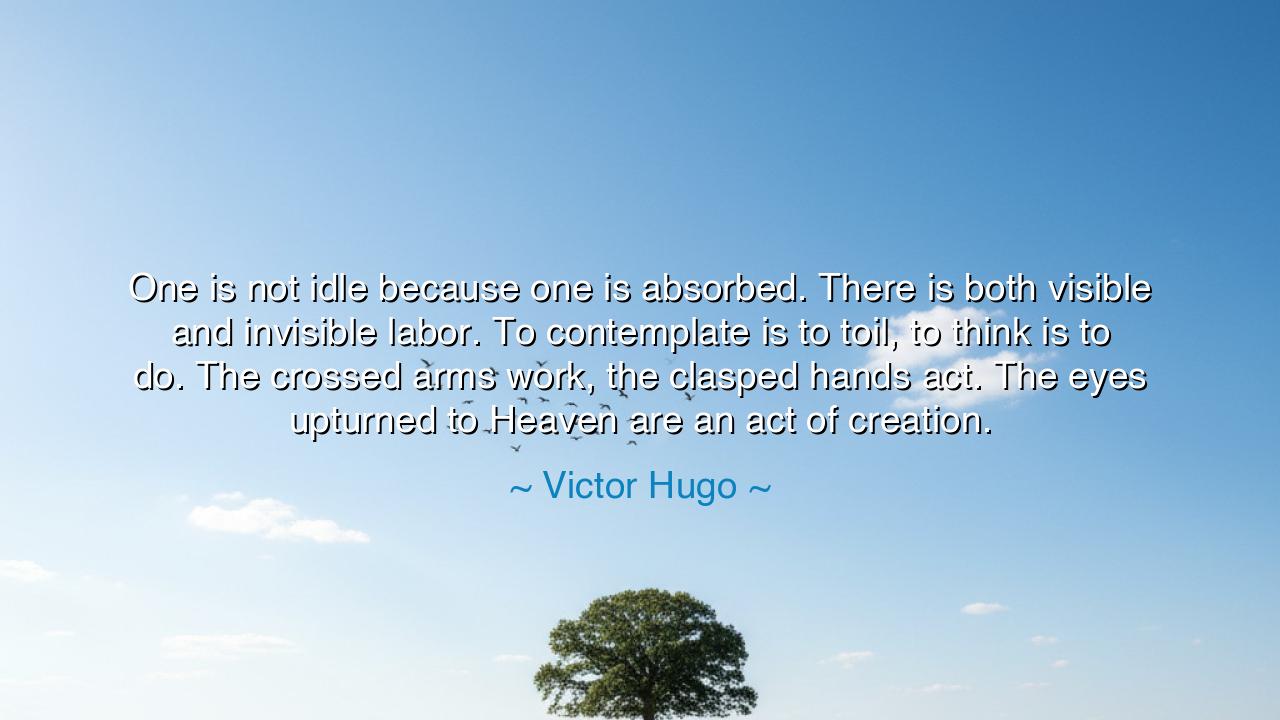
One is not idle because one is absorbed. There is both visible
One is not idle because one is absorbed. There is both visible and invisible labor. To contemplate is to toil, to think is to do. The crossed arms work, the clasped hands act. The eyes upturned to Heaven are an act of creation.






The great sage and poet Victor Hugo speaks of the hidden power of the mind and spirit when he declares: “One is not idle because one is absorbed. There is both visible and invisible labor. To contemplate is to toil, to think is to do. The crossed arms work, the clasped hands act. The eyes upturned to Heaven are an act of creation.” In these words, he lifts the veil from the silent work of the soul, revealing that not all labor is measured by motion or noise.
The world often judges idleness by appearances, praising the hands that build and move while overlooking the stillness of deep thought and reflection. Yet Hugo reminds us that there is visible labor, such as the plowing of fields or the crafting of stone, and invisible labor, such as the shaping of ideas, dreams, and visions that guide all visible action. The mind at rest is not inactive, for it stirs in unseen ways, preparing the foundations upon which great deeds are built.
To contemplate is to toil, for the inner world demands as much strength and perseverance as the outer. When a thinker wrestles with a problem, or a visionary dreams of new worlds, their silent struggle is a form of creation. Even crossed arms and clasped hands—symbols of prayer, meditation, or deep thought—are acts of movement, though their motion is hidden within the spirit. What seems like stillness to the eyes of men is, in truth, a tempest of creation beneath the surface.
The phrase, “The eyes upturned to Heaven are an act of creation,” speaks of the sacred connection between thought and the divine. When one looks beyond the material world toward higher truths, the very act of seeking becomes a form of building. It is here that the greatest inventions, works of art, and spiritual awakenings are born. From this invisible labor springs the progress of humanity, guiding the hands of those who work in the visible realm.
Thus, let this wisdom endure: never mistake stillness for idleness, nor silence for emptiness. Honor both the visible and the invisible forms of work, for they are two halves of the same whole. The dreamer and the laborer, the thinker and the builder, each play their sacred part. And when the eyes are lifted to Heaven, even the quietest soul becomes a creator, shaping the destiny of the world through the unseen power of thought.






NATruong Ngoc Anh
Victor Hugo’s words speak to the importance of internal work. He makes a valid point about how contemplation, thought, and stillness can be just as valuable as physical labor. It makes me question how we, as a society, view productivity. Do we only reward visible effort, or can we also honor the quiet, invisible work that leads to creativity and change? How can we shift our mindset to value mental labor as much as physical labor?
Vvuminhphuc
This quote is a wonderful reminder of the depth of human effort. We often overlook the mental and emotional toil that goes into contemplation and reflection. It challenges us to reconsider how we define work and productivity. How often do we dismiss someone’s effort because we don’t see it? Shouldn’t we recognize that sometimes, the most important labor happens quietly in the mind and heart, not just in physical action?
KLTruong Khanh linh
Hugo’s words are a powerful reminder that work isn’t always about visible action. Mental labor—whether in contemplation, reflection, or even stillness—is often just as taxing and just as important. This makes me wonder, how often do we value only the work that can be seen or measured? Shouldn't we redefine what it means to work and acknowledge the power of thought, emotion, and inner creation in driving progress?
DEDuong En
I love this quote because it honors the unseen aspects of work. The idea that contemplation, thinking, or even a simple gesture like clasped hands is work is profound. It suggests that creativity and problem-solving can occur even when it seems like nothing is being done. How often do we assume that someone isn’t working just because they’re not actively moving or producing something visible? Shouldn’t we value the mental and emotional energy that goes into creating as much as the physical effort?
LLamson
This quote really shifts my perspective on productivity. Often, we associate work with tangible tasks, but Hugo reminds us that thought, contemplation, and even moments of stillness are labor too. It challenges the way we measure someone's contribution. Do we place enough importance on intellectual and emotional labor, or do we only recognize the visible, physical work? How can we better appreciate the effort behind quiet reflection?